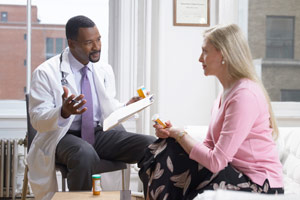
A project of the U.S. Department of Health and Human Services Office on Women's Health


If you think you may have been exposed to HIV, see a doctor right away. The doctor may decide that you should get post-exposure prophylaxis (PEP). PEP are drugs that may lower your chances of getting HIV after you have been exposed to the virus. But the drugs will only work if you see a doctor within 48 to 72 hours after exposure. So you must see a doctor right away.
Not everyone is a candidate for PEP. It is hard to stick with and can have many side effects. You need to take many pills exactly on time, every day for 28 days.
These drugs are most often used for high-risk people. A woman who has been raped or sexually assaulted is at high-risk. Also, health care workers may be exposed to HIV, such as by accidentally sticking themselves with a needle containing HIV-positive blood. PEP may be used in other situations, too. Ask your doctor if you are at risk of HIV infection and whether PEP is right for you.
There is currently no way for women to prevent getting infected by HIV by taking medicine before being exposed to the virus. But research is exploring possibilities. A new study showed that the oral HIV drug Truvada may help some people. It decreased the risk of HIV infection in men who did not already have HIV and were having sex with men. Research is being done to see if this would be effective in women.
Researchers are also looking at the use of microbicides to prevent HIV in women. Microbicides are usually a gel or a cream. They can be applied to the vagina or rectum before sex. They work to kill certain viruses or bacteria that can be passed during sex. In one recent study, women who used microbicide vaginally 12 hours before and after sex were almost 40 percent less likely to get HIV than women who did not use it. However, it did not prevent infection in all women. More research needs to be done before microbicides would become available to all women. Currently condoms remain the best way for women to prevent getting infected with HIV during sex.
Content last updated July 01, 2011.
Resources last updated July 01, 2011.